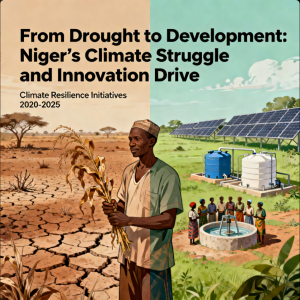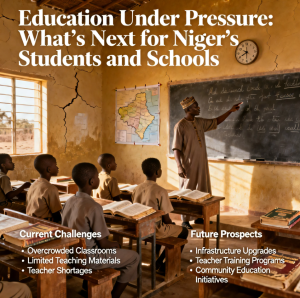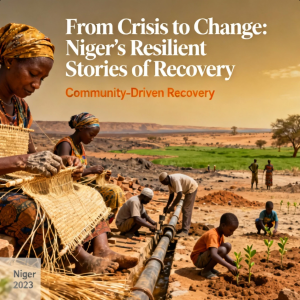Discover how Niger’s economy is adapting to global challenges. From inflation and trade shifts to local innovation, explore how resilience defines the nation’s recovery.
In an era of global uncertainty, Niger’s economy stands at a crossroads — facing challenges from rising inflation, trade disruptions, and shifting global markets. Yet, beneath the surface of these pressures lies a story of adaptation, community-driven innovation, and economic resilience.
While global headwinds have hit developing nations hardest, Niger’s blend of local ingenuity and strategic reform is helping it navigate an unpredictable landscape.
1. Inflation and Cost of Living: The Everyday Struggle
Like many nations, Niger has felt the squeeze of global inflation. Increases in fuel prices, food imports, and transportation costs have directly impacted households.
- Imported goods have become more expensive due to supply chain disruptions
- Currency fluctuations have affected purchasing power
- Basic food items — particularly grains and cooking oil — have seen sharp price spikes
Yet, small-scale producers and local cooperatives are stepping up. Many have turned to domestic agriculture and community markets to reduce dependence on imports and stabilize prices locally.
In a time of scarcity, local self-reliance has become a powerful tool.
2. Trade and Regional Shifts
Niger’s position in West Africa’s economic network makes it both vulnerable and vital. Border closures, sanctions, and global trade turbulence have disrupted exports — especially in uranium, livestock, and agricultural products.
However, the country is strengthening ties with regional partners through the Economic Community of West African States (ECOWAS) and investing in infrastructure corridors to diversify trade routes.
Diversification isn’t just a strategy — it’s a necessity for survival.
3. The Role of Agriculture in Stability
Agriculture remains the heart of Niger’s economy, employing over 80% of the population. Despite recurring droughts and erratic rainfall, innovation in irrigation, seed quality, and rural financing is slowly transforming the sector.
- Microfinancing programs are helping farmers access affordable credit
- Community cooperatives are investing in solar-powered irrigation systems
- Partnerships with NGOs and development agencies are strengthening food security
Agriculture is more than an industry here — it’s the backbone of national resilience.
4. Digital Innovation and Youth Entrepreneurship
A quiet transformation is also happening in Niger’s cities. Young entrepreneurs are using technology to create solutions for everyday challenges — from mobile payment systems to agritech startups.
- Digital platforms are connecting farmers directly to buyers
- Youth-led ventures are fostering local job creation
- Online education and e-commerce are expanding access to global markets
While traditional sectors steady the nation, digital innovation is shaping its future.
5. Balancing Reform and Reality
Economic reform is never simple. Niger’s leaders face the challenge of balancing fiscal responsibility with social welfare. External debt, inflationary pressures, and political transitions all demand careful navigation.
Yet, the nation continues to attract foreign investment in energy, mining, and renewable sectors — signaling confidence in its long-term potential.
The path forward may be narrow, but it’s being built one smart policy at a time.
Conclusion
Despite global economic turbulence, Niger’s economy shows that resilience is not just about numbers — it’s about people, persistence, and adaptability.
From farmers rebuilding food security to entrepreneurs driving digital change, Niger’s story is one of steady progress against the odds.
In the face of global pressures, Niger isn’t standing still — it’s finding its own way forward.




